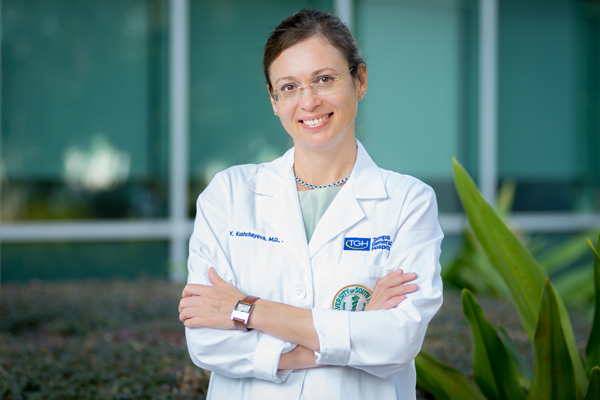Yevgeniya Kushchayeva, MD, PhD, came to the United States determined to contribute to science and medicine.
As a teenager in Soviet Ukraine, when the Chernobyl nuclear disaster rendered an entire region uninhabitable, her family living in another area took in families that evacuated and she witnessed the hard impact radiation had on people’s health, including thyroid cancer.
“My decision to pursue a career in endocrinology is deep-seated and passionate,” Dr. Kushchayeva said. “The dramatic experience of watching my new friends and classmates from Chernobyl fall ill convinced me to commit myself to becoming a doctor. To this end, I focus my research on the effects of ionizing radiation on the thyroid gland, and my clinical work on treating thyroid disease and helping in the effort to find cures.”

Dr. Kushchayeva joined USF Health in July 2019 as associate professor of medicine. She specializes in the diagnosis and treatment of thyroid abnormalities, as well as bone disorders and endocrine-related complications of immunotherapy.
The correlation between the thyroid and bone may not seem obvious to most of us, but there is a clear connection, Dr. Kushchayeva said.
“Thyroid hormones are important for bone mineral homeostasis and bone density,” she said. “Excess of T4 and T3 hormones is associated with reduced bone mineral density, leading to an increased risk for bone fractures.”
Thyroid disease is a significant health problem, though up to 60 percent of those with a thyroid problem are unaware of their condition. Overall, thyroid disease affects an estimated 20 million Americans, and more than 12 percent of the U.S. population will develop a thyroid condition during their lifetime. Women are five to eight times more likely than men to have thyroid problems. One woman in eight will develop a thyroid disorder during her lifetime.
Dr. Kushchayeva also specializes in the endocrine-related complications of immunotherapy.
“Immunotherapy is a new and effective anticancer therapy but in some patients can affect the endocrine systems” she said. “Some patients may develop hypophysitis – inflammation of the pituitary gland. In addition, one of the more common side effects with checkpoint inhibitors and cytokines is a change in the function of the thyroid gland. Sometimes this can be corrected with thyroid replacement medication and requires frequent monitoring of thyroid function.”
Prior to coming to USF Health, Dr. Kushchayeva was at the National Institutes of Health, serving a four-year endocrinology fellowship in the Physician-Scientist Training Program of the American Board of Internal Medicine in the National Institute of Diabetes and Digestive and Kidney Diseases in Bethesda, MD.
Her earlier training included a residency in surgery and practice as a physician-researcher in the Kiev City Thyroid Center, the largest of its kind in Ukraine, as well an internal medicine residency at Georgetown University Hospital/Washington Hospital Center. She also conducted a research fellowship at the University of California-San Francisco, research fellowship at the Arizona State University, and research fellowship at the Thyroid Cancer Center at Washington Hospital Center.
As an endocrinologist, Dr. Kuschchayeva is seeing patients in the USF Diabetes and Endocrinology Center.
Dr. Kushchayeva treats a range of thyroid disorders, including hyperthyroidism (Grave’s disease, toxic nodule/adenoma), hypothyroidism, thyroid neoplasia, thyroid nodules, thyroid orbitopathy. She also treats calcium and bone disorders including but not limited to hypercalcemia, hyperparathyroidism, familial hypocalciuric hypercalcemia, hypocalcemia, hypoparathyroidism, pseudohypoparathyroidism, osteopenia, osteoporosis, vitamin D deficiency. She also sees patients with adrenal disorders, including adrenal insufficiency, adrenal nodules, adrenal hyperplasia, congenital adrenal hyperplasia, Conn syndrome, and Cushing syndrome, and with pituitary disorders, including Cushing disease, diabetes insipidus, pituitary adenoma, hypopituitarism.
Dr. Kushchayeva has both an MD and a PhD degree, giving her the added advantage of a career as both a clinician and researcher.
“Although my work as a physician gave me advanced knowledge and skills in the medical field, my research eventually led me to a much greater understanding of fundamental biology,” she said. “My hope is that this dual perspective helps me provide better care to my patients, as well as helps me conduct stronger research.”
